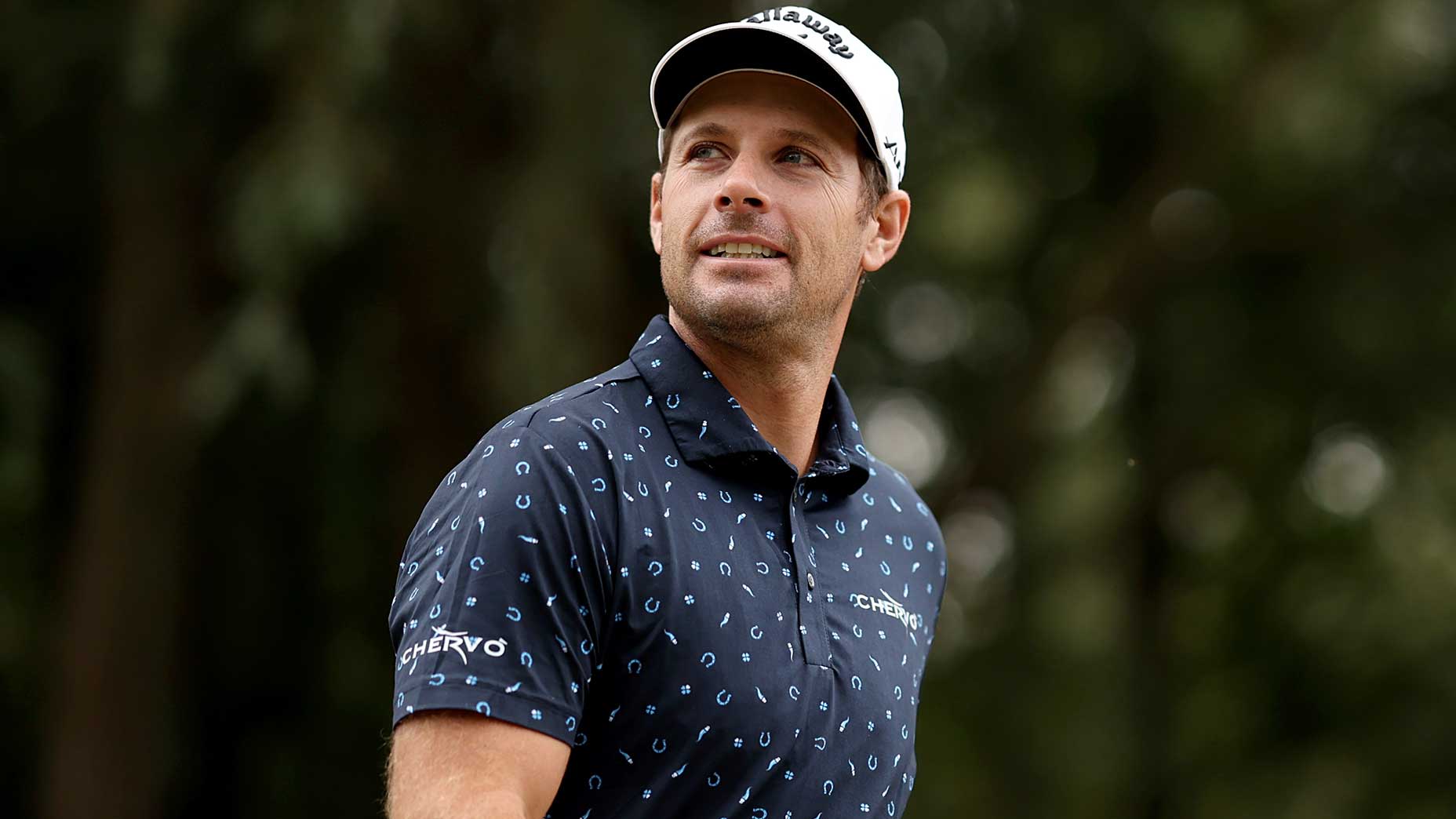Hosung Choi grew up by the sea in the port city of Pohang, South Korea. He was a fearless kid who relished the challenge of swimming in typhoons when the water was at its roughest and most dangerous. He loved the sensation of the surf batting him around like a rubber duck and on several occasions found himself trapped in whirlpools from which he had to furiously kick and paddle to escape.
Hosung’s family had little money. When he wasn’t in school, he worked in the field and on the sea with his father, who was a farmer and fisherman. During a visit to a tuna factory in his senior year in high school Hosung lost the tip of his right thumb in a freak chainsaw accident. He went on to work jobs in construction and mining. He delivered groceries. Just as the tide had knocked him about, so too did life.
At 26, Hosung landed a part-time gig at Anyang Country Club, an upscale golf club about an hour’s drive south of Seoul. He did not play golf but he was intrigued by the game. His tenure began in the harsh depths of winter but that didn’t stop Hosung from beating balls in his downtime, his hands blistering and bleeding in the frigid air.
Swing by swing, shot by shot, and without the assistance of an instructor, he slowly unriddled the game. His move was not graceful but it was effective. He turned semi-pro and began playing in tournaments — grinding in them, really. “I lived year after year in a struggle,” he says today. “But I had the desperate and urgent mindset that golf was all I had. I think that is what made me.”
*****
The tweets began popping about three weeks ago, in the wee hours of June 23. A Korean golfer was in contention in the third round of the Korea Open with a corkscrew swing straight out of a goofball golf comedy. Sports fans were curious. Golf geeks were delirious and/or incredulous. In this era of instant information, how could this madcap swing only now be surfacing? Was this some kind of Sidd Finchian hoax?
His name was Hosung Choi; Wikipedia said he was a 44-year-old journeyman on the Korean and Japan tours. His professional highlights included a pair of wins on the Korean circuit, in 2008 and ’11, and a third title, five years ago, at the now-defunct Indonesia PGA Championship. But forget his career path. American golf fans were fixated on Choi’s swing path, which culminates with a cartoonish follow-through in which he lifts his right foot off the ground and swings it around his body like a Russian dancer. (A Japanese journalist likened Choi’s move to a fisherman casting a rod.)

Choi’s theatrics don’t end with his follow-through. As his ball takes flight, he contorts his body as if he’s trying to escape a straightjacket, bending and twisting in whatever direction he is imploring his shot to fly. His reactions, after good and bad shots alike, are equally expressive: lusty fist pumps, widened eyes, dramatic tumbles. In a game short on color, Choi is a virtual kaleidoscope.
By the morning of June 24, Choi had lit up golf Twitter. Light-hearted quips were flying: “Not all heroes wear capes,” joked one observer. So, too, were copycats: the Web.com tour tweeted out a video of several Web pros mimicking Choi’s action. Awe was also in the air: With a top-three finish at Woo Jeong Hills, Choi would earn an exemption into the British Open. This swing vying for the claret jug? Golf’s Twitterati could hardly contain themselves.
Even major winners caught Hosung Fever.
“May have to try this on the range today,” Justin Thomas tweeted to his nearly 250,000 followers.
“Oh me too,” replied Luke Donald, “might be able to squeeze out another mile, mile and a half swing speed.”
Seven-thousand miles away, Hosung Choi was oblivious to the frenzy he had stirred up.
******
“I’m not internet savvy and I turn off my phone during tournaments so I had no idea until after it was over,” Choi said by phone from Korea the other day. He spoke in his native tongue with a translator assisting a reporter on the other end of the line.
“During the tournament I only focus on the ball so I don’t know how I’m swinging. After I heard about the buzz, I checked after the tournament and saw that a lot of stuff was going around the internet. I looked up a video and even I thought that my swing was ridiculous and funny. I couldn’t tell if I was an amateur or a pro. Being that my swing is so funny, I was grateful that the viewers took it positively.”
Part of the reason why Choi’s viral-ready swing didn’t make the rounds earlier is because he has only been swinging this way for a couple of years. For most of his career he had a more conventional follow-through but as Choi aged he faced a common problem: he was losing flexibility and distance. “I thought about how I can overcome this and started leaning toward big and wild movements,” Choi says. “Then it evolved into the ‘fisherman’ swing. I think there are pros and cons to my swing because it deviates a lot from the norm. That’s why I am deeply moved by all the favorable attention and want to do better.”
Choi says his funky action — it’s essentially a flamboyant version of Gary Player’s patented step through — has made him 15 to 20 yards longer. And with longer drives, he says, “there are more opportunities for a birdie.
“As I keep doing it my body gets used to it and the swing is more comfortable to me. If I hold my body too rigidly when I swing, I feel that my ankles and flexibility don’t hold up and it is easier for me to get hurt. But as I started to swing freely, I use my strength when needed and loosen up when it’s not needed.”
Much to Twitter’s chagrin, Choi stumbled in the fourth round of the Korea Open. After holding the 54-hole lead, he posted a three-over 74 on Sunday to tie for fifth and miss out on the invite to Carnoustie. One fan was so moved by Choi’s performance that he launched an online petition to try and convince the R&A to give Choi an Open bid anyway. “As Leonardo da Vinci did with a brush and oil,” the petition proclaimed, “Hosung Choi paints with a club and ball.”
Choi is aware of the idiosyncrasies in his swing; he just chooses not to dwell on them or analyze them. All these years later he still is without a coach. Ditto a launch monitor or any other kind of swing-splicing technology. “There are a lot of things that I don’t like about my swing so I just don’t look at it,” he says. “I don’t want to reproach myself.”
His injured thumb, which doctors mended with transplanted flesh, still bothers him. When he plays many days consecutively, the wound aches. “In October, when it starts to get cold, it starts to bleed a lot and since I always have to play golf, it never seems to have enough time to heal,” he says.
But Choi endures, just as he always has.
*****
Are his playing partners are ever irritated or distracted by his flair?
“I don’t know,” he said. “It’s my personal swing and when I’m at a tournament all I’m thinking about it surviving, so I’m very focused. As we all look different I don’t think it’s possible for our swings to be the same. Tall, short, flexible, fat, thin — they all have different swings. I don’t believe there is a good or bad swing.”
Choi marvels at the talents of PGA Tour players and what he calls their “fancy shots” but harbors no illusions of playing in the U.S., even for a start or two. (PGA Tour events should be lining up to give this guy a sponsor’s exemption.) “If I had a dream, it would be to have known golf earlier and started earlier,” he says. “Then I feel that I would have dreamed more about playing on the PGA.”
Instead he has found his calling bouncing around a couple of other tours, chasing titles from Singapore to Fukushima, making friends and fans along the way.
He’s still “a little dazed” from his newfound internet fame but also grateful, especially to Justin Thomas and the other Tour pros who tweeted about his swing and helped make him, at least for one shining moment, the toast of golf.
“I’m surprised that people that live so far from Korea know about me,” he says. “I just want to say thank you. I don’t know how to express my gratitude.”







